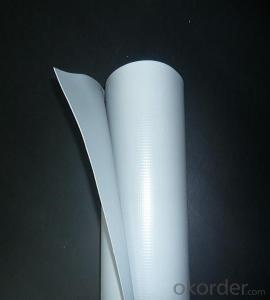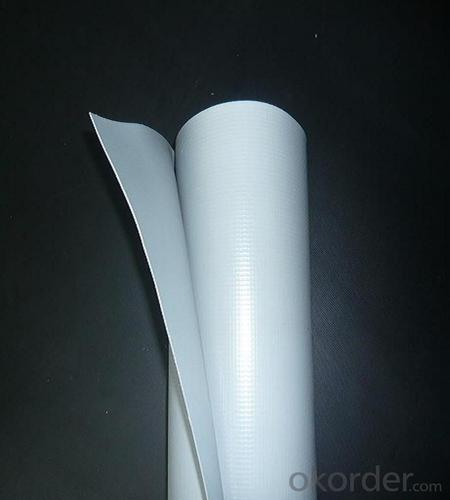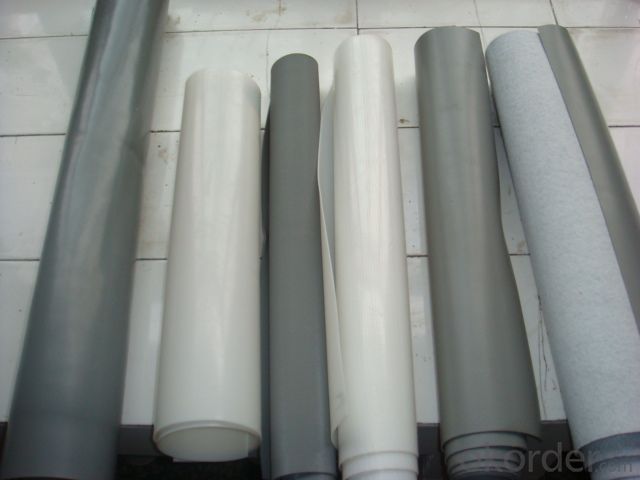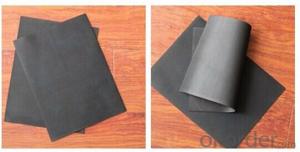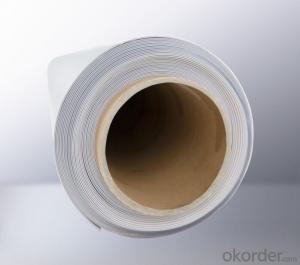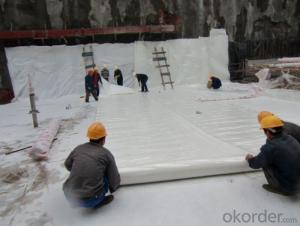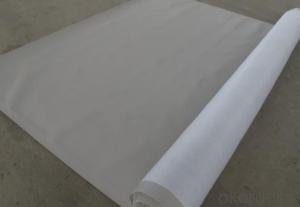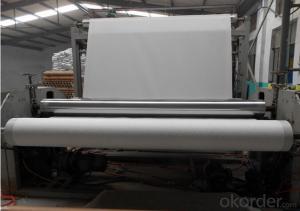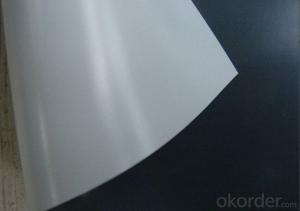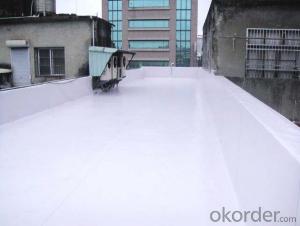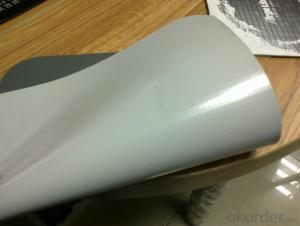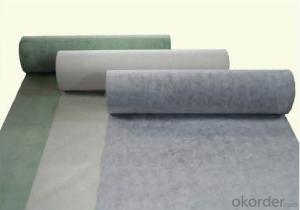Polyvinyl Chloride (PVC) Plastic Waterproofing Membrane
- Loading Port:
- China main port
- Payment Terms:
- TT OR LC
- Min Order Qty:
- 5000 m²
- Supply Capability:
- 100000 m²/month
OKorder Service Pledge
OKorder Financial Service
You Might Also Like
1. Introduction of PVC Waterproofing Membrane
Polyvinyl chloride the pvc waterproofing plastic membrane is a kind of excellent performance of polymer waterproof material,PVC resin as the main raw material,add all kinds of special additive and anti-aging composition,the use of advanced equipment and advanced technology extrusion rolling is made.The product has the tensile strength and elongation high shrinkage of small,low temperature soft good,long life and other advantages, the products wide 1.2m to 3.0m, the thickness of 0.8-2.0 mm(special specifications can be customized),stable performance,reliable quality,construction is convenient.
2. Specification of PVC Waterproofing Membrane
Length | 20m/roll or customized |
Width | 2.05m |
Thickness | 1.2mm; 1.5mm; 2.0mm |
Type | Homogeneous, Reinforced, Fabric back |
If Exposed | Exposed and Non-exposed |
Color | White, Grey or customized |
3. Features of PVC Waterproofing Membrane
1) Excellent aging resistance. Service life of roofing material is over 20 years;
service life of underground material is over 50 years.
2) Root resistant penetration, specially used on planting roof.
3) Welding installation. Joints are solid and environment friendly, no pollution.
4) High tensile strength, good elongation and dimensional stability.
5) Good plasticity, easy and suitable for details installation.
6) Fireproof. Fire extinguished out of the ignition resource.
7) Surface is smooth, no fading and dirty resistant.
4. Applications of PVC Waterproofing Membrane
1) All kinds of roofs, such as steel structure roof, planted roof etc.
2) Underground engineering, such as building basement, subways, tunnels, air raid shelter, etc.
3) Other projects like artificial lake, dam, water reservoir, grain storehouse, etc.
5. FAQ of PVC Waterproofing Membrane
a.Can we get some samples before place order?
Answer: We can send the free samples to you by freight collect.
b.How many years can your PVC membrane guarantee?
Answer: We will guarantee the quality for 5 years at least.
c.Which countries you ever export the product?
Answer: We export the PVC membrane to South Africa, Middle east and even European countries.
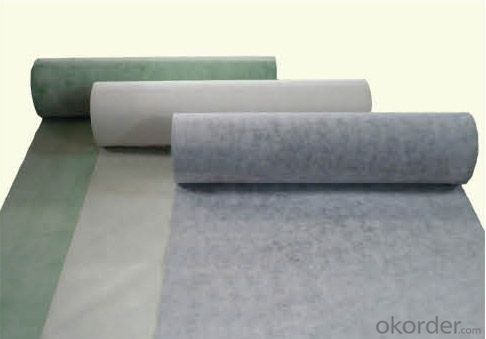
- Q: Can a waterproofing membrane be used in areas with vehicular traffic?
- Certainly! It is indeed possible to utilize a waterproofing membrane in regions frequented by vehicles. In reality, there exist distinct variants of waterproofing membranes meticulously crafted to endure the pressure and motion exerted by automobiles. These specialized membranes, referred to as vehicular or traffic-bearing membranes, are generally composed of sturdier materials like rubberized asphalt or modified bitumen. They are purposefully engineered to furnish a robust and flexible barricade against water and moisture, whilst simultaneously withstanding the burdensome loads and incessant traffic commonly associated with vehicles. Vehicular membranes find widespread application in parking garages, bridges, and other sites where vehicles are commonly found.
- Q: Can a waterproofing membrane be used for stadiums or arenas?
- Yes, a waterproofing membrane can be used for stadiums or arenas. Waterproofing membranes are commonly used in construction to prevent water infiltration, and they can be applied to the roofs, walls, or foundations of stadiums or arenas to protect them from water damage. These membranes are designed to withstand harsh weather conditions and provide long-lasting protection, making them suitable for large-scale structures like stadiums or arenas.
- Q: Can a waterproofing membrane be used in areas with heavy foot traffic?
- Areas with heavy foot traffic can indeed utilize a waterproofing membrane. Many waterproofing membranes are explicitly engineered to endure extensive usage and mistreatment, thereby making them ideal for heavily frequented spaces like walkways, balconies, and parking decks. These membranes are typically constructed from robust materials such as rubber, PVC, or modified bitumen, which display resistance against wear and tear. In addition, certain membranes possess a surface that prevents slipping, thereby enhancing safety in walking zones. To guarantee enduring protection in areas with heavy foot traffic, it is crucial to carefully select a waterproofing membrane that suits the specific application and fulfills the necessary durability standards.
- Q: Can a waterproofing membrane be used in areas with high humidity and moisture?
- Yes, a waterproofing membrane can be used in areas with high humidity and moisture. The purpose of a waterproofing membrane is to provide a protective barrier against water and moisture, making it suitable for such environments. It helps prevent water infiltration, mold growth, and damage caused by excessive moisture, making it an ideal solution for humid and moisture-prone areas.
- Q: Can a waterproofing membrane be used on sloped surfaces?
- Yes, a waterproofing membrane can be used on sloped surfaces. In fact, it is highly recommended to use waterproofing membranes on sloped surfaces to prevent water infiltration and potential damage. The membrane is designed to create a barrier against water, and when properly installed, it can effectively protect sloped surfaces such as roofs, balconies, or even retaining walls. The membrane is typically flexible and can conform to the shape of the slope, ensuring full coverage and a watertight seal. Additionally, some waterproofing membranes have additional features like self-adhesive properties or reinforcement layers specifically designed for sloped surfaces, further enhancing their effectiveness. Overall, using a waterproofing membrane on sloped surfaces is an excellent way to ensure long-term protection against water damage.
- Q: Can waterproofing membranes be used on precast concrete panels?
- Yes, waterproofing membranes can be used on precast concrete panels. Precast concrete panels can be susceptible to water penetration, which can lead to moisture damage and deterioration of the concrete. Waterproofing membranes are effective in preventing water infiltration by creating a barrier between the concrete surface and the external environment. These membranes are typically applied to the exterior surface of the precast panels, forming a protective layer that prevents water from seeping through the concrete. By using waterproofing membranes, precast concrete panels can be made more durable, longer-lasting, and resistant to moisture-related issues.
- Q: Can a waterproofing membrane be used on precast stone block surfaces?
- Yes, a waterproofing membrane can be used on precast stone block surfaces. Waterproofing membranes are commonly used to prevent water penetration and moisture damage in various types of surfaces, including precast stone blocks. These membranes are designed to create a barrier against water, preventing it from seeping into the surface and causing issues such as mold, deterioration, or structural damage. Applying a waterproofing membrane to precast stone block surfaces can help enhance their durability and longevity by protecting them from water-related problems. However, it is important to carefully follow the manufacturer's instructions and ensure that the chosen waterproofing membrane is suitable for the specific type of precast stone block surface being treated.
- Q: Are waterproofing membranes suitable for bridge abutments?
- Yes, waterproofing membranes are suitable for bridge abutments. These membranes provide an effective barrier against water infiltration, protecting the abutments from moisture-related damages such as corrosion, deterioration, and leakage. They help extend the lifespan of the bridge and ensure its structural integrity.
- Q: Can a waterproofing membrane be used on precast concrete block surfaces?
- Yes, a waterproofing membrane can be used on precast concrete block surfaces. Waterproofing membranes are commonly used to protect below-grade structures, such as basements and foundations, from water intrusion. Precast concrete blocks are commonly used in the construction of these structures, and applying a waterproofing membrane can help prevent water from penetrating through the concrete and causing damage. The membrane acts as a barrier, preventing the passage of water while still allowing the concrete to breathe and release any moisture buildup. Additionally, waterproofing membranes can also help improve the overall durability and longevity of the precast concrete blocks by protecting them from moisture-related issues such as cracking, spalling, and corrosion. It is important to choose a waterproofing membrane that is specifically designed for below-grade applications and is compatible with concrete surfaces to ensure proper adhesion and long-term effectiveness.
- Q: Can a waterproofing membrane be used for railways or train stations?
- Yes, a waterproofing membrane can definitely be used for railways or train stations. Waterproofing membranes are commonly used in various construction projects to protect structures from water damage and ensure their longevity. In the case of railways and train stations, where there is constant exposure to weather elements and potential water infiltration, a waterproofing membrane can play a crucial role in preventing water ingress into the infrastructure. Waterproofing membranes are typically applied to different areas of the railway or train station, such as the underground tunnels, platforms, parking areas, and even the roofs. These membranes are designed to create a barrier against water and moisture, preventing them from seeping into the structure and causing damage. By preventing water infiltration, a waterproofing membrane helps to maintain the structural integrity of the railway or train station and extend its lifespan. In addition to protecting against water, waterproofing membranes also provide other benefits such as preventing the growth of mold and mildew, improving energy efficiency by reducing heat loss, and enhancing the overall durability of the structure. They are available in various types, including liquid-applied membranes, sheet membranes, and cementitious coatings, allowing for versatile application depending on the specific needs and requirements of the railway or train station project. Overall, the use of a waterproofing membrane in railways and train stations is highly recommended to ensure the long-term performance and maintenance of these critical infrastructures.
Send your message to us
Polyvinyl Chloride (PVC) Plastic Waterproofing Membrane
- Loading Port:
- China main port
- Payment Terms:
- TT OR LC
- Min Order Qty:
- 5000 m²
- Supply Capability:
- 100000 m²/month
OKorder Service Pledge
OKorder Financial Service
Similar products
Hot products
Hot Searches
Related keywords
